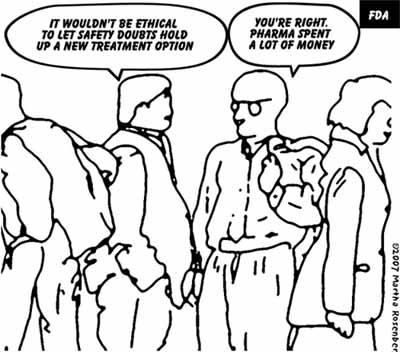|
Health After two days of hearings, the FDA Psychopharmacologic Drugs Advisory Committee
voted to recommend approval of AstraZeneca�s Seroquel (quetiapine) for the
acute treatment of schizophrenia in adolescents 13-17, acute treatment of
bipolar mania in children 10-12 and adolescents 13-17; Pfizer�s Geodon
(ziprasidone) for the acute treatment of manic or mixed episodes associated
with bipolar disorder, with or without psychotic features in children and
adolescents ages 10-17; and Eli Lilly�s Zyprexa (olanzapine) for the acute
treatment of manic or mixed episodes associated with bipolar I disorder and
acute treatment of schizophrenia in adolescents. Most people know pharma�s blockbuster atypical antipsychotics Seroquel,
Zyprexa and Geodon, off label marketed to kids, the elderly, the
uncategorizable and the suggestible -- are you sure you don�t have racing
thoughts? ask ads -- correlate with weight gain, diabetes and metabolic
derangement. But who knew until the hearings that Seroquel also causes an extra seven
or eight heartbeats a minute in children? Possibly for as long as they take it?
With no studies to show the long term effect? Or the safety of drugs to treat
the effect? And no theory as to why? Who knew Seroquel could cause cataracts? Who knew Geodon could cause a prolonged QT interval also known as �sudden
death.� Who knew the atypicals, along with tremor and muscle rigidity, could
cause the permanent and stigmatizing tardive dyskinesia they were developed to
prevent? Hello? Of course, AstraZeneca doctor Liza O�Dowd did her best during her
presentation to sail through the negatives, assuring the panel that Seroquel�s
blood pressure, weight, glucose and prolactin issues could be �controlled and
monitored� and that they �didn�t lead to discontinuation of the study� (let�s
hope not when the trial was three weeks.) But she was less forthcoming when discussing the five child suicides seen
during trials, a slide she only produced in response to panel questions. AstraZeneca�s Ihor Rak, MD, did his best to dismiss cataract problems as �poor
hygiene, nutrition and accidents� seen with schizophrenics, but had no ready
answer when panelist member Benedetto Vitiello, MD, asked why not, then, remove
instructions to examine patient lenses from the prescribing information. AstraZeneca presenter Lili Kopala, MD, was certain the study suicides
stemmed from patients who were �still on the recovery curve,� but when panelist
Christopher Granger, MD, challenged her, she changed her mind and said, �they
may be random.� And panelists had other questions. Not being trained psychiatrists, how did you make the differential
diagnosis of bipolar for your studies? asked panelist Kenneth Towbin, MD. How
do you know irritability, anxiety or aggression don�t denote other disorders?
How could a Seroquel study in which children with mania are kept on stimulants
be scientifically valid -- or ethical? Children are often on �cocktails of seven or eight medications,� agreed
Rochelle Caplan, MD, and �once we get them off,� they might just have a
learning disability. Worse than problems diagnosing pediatric bipolar or schizophrenia -- 3,000
suspected childhood schizophrenia cases yielded only 110 actual cases in one
study said panelist Nitin Gogtay, MD -- and worse than the lack of �real world�
and mixed medicine �cocktail� studies was the brevity of the studies themselves,
said panelists. How can three- and six-week studies suggest safety for maintenance
treatment of schizophrenia and bipolar disorders which lasts decades? �We know
they won�t stop [using the medications] at the acute phase,� said Towbin. Panelist Granger confessed to �real discomfort� approving drugs which �generat[e]
metabolic syndrome in adolescents in a very short period of time� for �indefinite
use� on the basis of three- or six-week trials. �Hopefully we�re not exposing
someone for decades,� agreed fellow cardiologist Edward Pritchett, MD. But Thomas Laughren, MD, FDA�s director of psychiatric drugs was more
upbeat. Not only was he sure pediatric safety could be extrapolated from adult
studies -- promising to include the clinical leap on labels -- he didn�t want
to be derailed over the two children who perversely died from stroke and
cardiopulmonary failure in Geodon studies, either. There�s �hazard in drawing too much from subsetting the data,� said
Laughren. Phillip Chappell, MD, of Pfizer thanked him. Frank Greenway, MD, an endocrine specialist on the panel, was also
upbeat, observing prolactin elevation from the atypicals was less than a �prolactin
secreting tumor.� Whew. Still the elephant in the room at the proceedings was why drugs that are
already available off-label need FDA approval at all -- and why it�s urgent
that kids showing symptoms be treated now. (One pharma doctor claimed gray matter shrinks every time someone is �psychotic�
but others admitted early treatment has no effect on the course of the
diseases.) The answer of course was in the other elephant in the room -- the wall of
40 pharma-funded doctors sitting at attention, outnumbering FDA representatives
two to one and unabashedly referred as �sponsors.� (Though their Medicaid
streams imply that�s backwards.) It�s the sponsors who exhort doctors -- and parents -- to subject kids to
increased heartbeats, sudden death, metabolic syndrome, tardive dyskinesia,
cataracts, stroke and suicidal side effects for diseases they may not even
have. Certainly that�s how two mothers who testified during the open public
hearings felt. Liza Ortiz of Austin, Texas, lost her 13-year-old son to Seroquel
toxicity earlier this year. �His hands twisted in ways I never thought possible
in the I.C.U.,� she said. Mary Kitchens of Bandera, Texas, said her son suffers from crossed eyes,
nightmares, trembling, neutropenia, hypothyroidism, tachycardia, dyskinesia and
cogwheeling since Seroquel treatment. �AstraZeneca marketed this to my child in 2003,� she said holding the
original Seroquel package for the panel to see. �And now they want your seal of
approval.� Copyright © 1998-2007 Online Journal Email Online Journal Editor |
